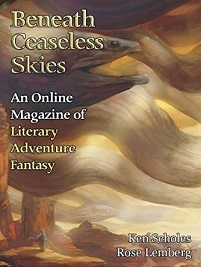 Beneath Ceaseless Skies #175, June 11, 2015
Beneath Ceaseless Skies #175, June 11, 2015
“On the Freedom of Agency and the Finding of Lost Hearts” by Ken Scholes
Reviewed by Bob Blough
The two stories in the 175th issue of Beyond Ceaseless Skies are literate fantasies by two authors – one an established pro and the other a writer new to me. It is the newer writer that shines.
Ken Scholes has been around for a while. I have enjoyed his Psalms of Isaac novel series very much, but in “On Freedom of Agency and the Finding of Lost Hearts” (Scholes loves long titles) he is not on his game. It is a fairly straightforward story told in a basic fairytale-esqe language about a female thief in contract to a demon who must enter the Eldenwood to steal a magical amulet. It is competent but too standard to be exciting.
However, “Grandmother-nei-Leylit’s Cloth of Wind” by Rose Lemberg is a superior fantasy. It is a deeply felt and well considered story with a Middle Eastern flair. It deals with gender roles but through the use of pronouns, not sex or physical types. Words are its most important theme—words used to describe and delimit our lives. It tells us that stories and words are the truths we tell to ourselves. The story is complicated but the plot is essentially the coming of age of a young girl. She falls in love with Gitit, but the death of one grandmother, the family history hidden by her grandmothers, and the birth of an unspeaking child, Kimi, to the family start them all—narrator, Gitit, Kimi and the living grandmother—on an odyssey to find the makers of the cloth of winds. The story is complex without being overly complicated, but it is the theme of language/words that flow through this story as its life-blood. Our narrator is good with languages, the child Kimi does not speak, the grandmothers hid a terrible and beautiful secret by not speaking and the very language of gender association is explored with depth usually not found in a novelette. A rich and rewarding work that compares favorably with Ancillary Justice by Ann Leckie in its depiction of fluid gender roles. This story is an accomplished work of rare insight.